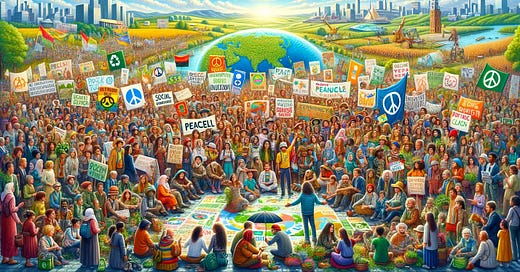Chomsky supports grassroot activism
Grassroot activism is our hope for the future, Noam Chomsky, reminds the progressives in an interview with The Ink.
Introduction: This week, The Ink newsletter pays tribute to Noam Chomsky, a towering figure on the left, whose declining health may end his public appearances. The focus is on Chomsky's political impact and his advocacy for constant activism.
Chomsky's Influence: Chomsky has revolutionized the field of linguistics and significantly impacted political thought. Recognized as the father of modern linguistics, he is also known for his critiques of power and his role as a prominent left public intellectual.
2020 Interview Insights: Anand Giridharadas shared an in-depth 2020 interview with Chomsky discussing his reasons for supporting Joe Biden in the 2020 election, despite his usual critique of establishment politics. Chomsky emphasized the importance of activism and the role of movements in shaping political agendas.
Introduction: This week, The Ink newsletter pays tribute to Noam Chomsky, a significant figure on the left, whose declining health may soon end his public appearances. The focus is on Chomsky's political impact and his advocacy for constant activism.
The Power of Grassroots Movements in Sweden and Worldwide
Margaret Mead's Insight: "Never doubt that a small group of thoughtful, committed citizens can change the world. Indeed, it's the only thing that ever has."
Strength in Conversations: There is power in our everyday conversations. Sharing sustainable ideas can influence more people than the conversation's participants. Your thoughts and discussions can spark a positive cycle of change.
Personal Experience: Many others are likely fighting the same battles. I have experienced how issues I once advocated on my own for have later gained broader support, such as promoting classical architecture and structural environmental solutions.
Influence of Minority Opinions: Solomon Asch's 1950s experiments showed that even one dissenting voice could influence group opinions. Similarly, Muzafer Sherif's studies in the 1930s demonstrated how small conversational shifts could alter group norms.
Support from the People: Grassroots movements are crucial in challenging policies like market-driven rent hikes or promoting structural environmental solutions. People are more likely to support effective climate solutions that don't place excessive demands on their daily lives.
Alexandria Ocasio-Cortez: She exemplifies how grassroots mobilization and social media can challenge established political structures. By engaging young voters and previously inactive citizens, she has become an influential voice in national debates on social and environmental issues.
Historical and Social Psychology: History and social psychology show that committed individuals and thoughtful discussions can drive significant change. Being well-informed and articulate about social issues increases the impact of your conversations.
Chomsky's Influence: Noam Chomsky has revolutionized linguistics and significantly impacted political thought. He is known for his critiques of power and his role as a prominent left public intellectual.
2020 Interview Insights: In a 2020 interview, Chomsky discussed his support for Joe Biden in the election despite usually criticizing establishment politics. He emphasized the importance of activism and movements in shaping political agendas.
Activism vs. Elections: Chomsky argues that real politics is ongoing activism, not just voting every four years. He advocated for voting to remove Trump but stressed the need to return to activism afterward.
Influence of Activist Movements: Chomsky highlighted the impact of the Sunrise Movement on Biden's climate policies, attributing advances to relentless activism rather than personal changes in Biden or the DNC.
Future Prospects: Chomsky is cautiously optimistic about figures like Alexandria Ocasio-Cortez, drawing parallels with past unexpected political shifts. He discussed the Progressive International's potential impact against global reactionary forces.
Power Dynamics and Social Movements: Citing philosopher David Hume, Chomsky emphasized that power lies with the governed and that rulers need consent. He noted the changing attitudes among the elite, illustrated by their nervousness at the 2020 Davos forum in response to growing public dissent.
Black Lives Matter and Changing Consciousness: Chomsky acknowledged the unprecedented public support for Black Lives Matter, attributing its success to shifts in public consciousness and sustained grassroots efforts.
Challenges of Political Communication: Chomsky believes the left could improve its messaging to appeal to a broader audience. He critiqued Bernie Sanders for labeling himself a socialist in the U.S., where the term is highly stigmatized.
Patriotism and Historical Truth: Chomsky advocates for a nuanced view of America, acknowledging both its oppressive and progressive elements. He calls for honesty about the country's history while appreciating its positive aspects.
Immediate Activism and Long-Term Change: Chomsky emphasizes that political change requires persistent effort over time. He encourages ongoing activism, using the Vietnam antiwar movement as an example of gradual, impactful change.
Social Media's Role in Power Dynamics: Chomsky views social media as a neutral tool that can facilitate activism but also create echo chambers.
Legacy and Respect for Grassroots Activists: Chomsky downplays the notion of a personal legacy, focusing on the countless unnamed individuals driving change. He respects those who resist oppression and fight for justice worldwide.
Grassroots Unity
Strong grassroots movements within left-leaning parties are essential to hold leaders accountable and prevent them from allying themselves too closely to those in power. Public movements can build a more democratic future.
Action Steps: Share posts from progressive blogs, form study circles, and engage in active discussions to support grassroots values and ensure that political leaders represent common people's needs and rights.
Activism vs. Elections: Chomsky and I argue that real politics is a question of ongoing activism, not just participating in elections every four years. We note the significant differences between candidates in recent elections, advocating for a brief focus on voting to remove the right in Sweden and Trump in USA while holding our activism strong.




